010 2024

HOW TO ATTRACT THE BEST TALENT AND BOOST PRODUCTIVITY
P.11 TAKING CONTROL
Bold approaches to unlock business opportunities
P.20 LEAD WITH GRACE
10 Emirati women share their leadership insights
14 - 18 OCT 2024

010 2024

HOW TO ATTRACT THE BEST TALENT AND BOOST PRODUCTIVITY
P.11 TAKING CONTROL
Bold approaches to unlock business opportunities
P.20 LEAD WITH GRACE
10 Emirati women share their leadership insights
14 - 18 OCT 2024
G lo ba l Col la boration to Forg e a Future
Connecting you to new business opportunities in the world’s most profitable digital ecosystems
200,000 +
6,500 + Countries 180 + Tech Executives
Ex hib it ors



Al Tamimi & Company has grown from a single office in Sharjah to become the largest law firm in the region
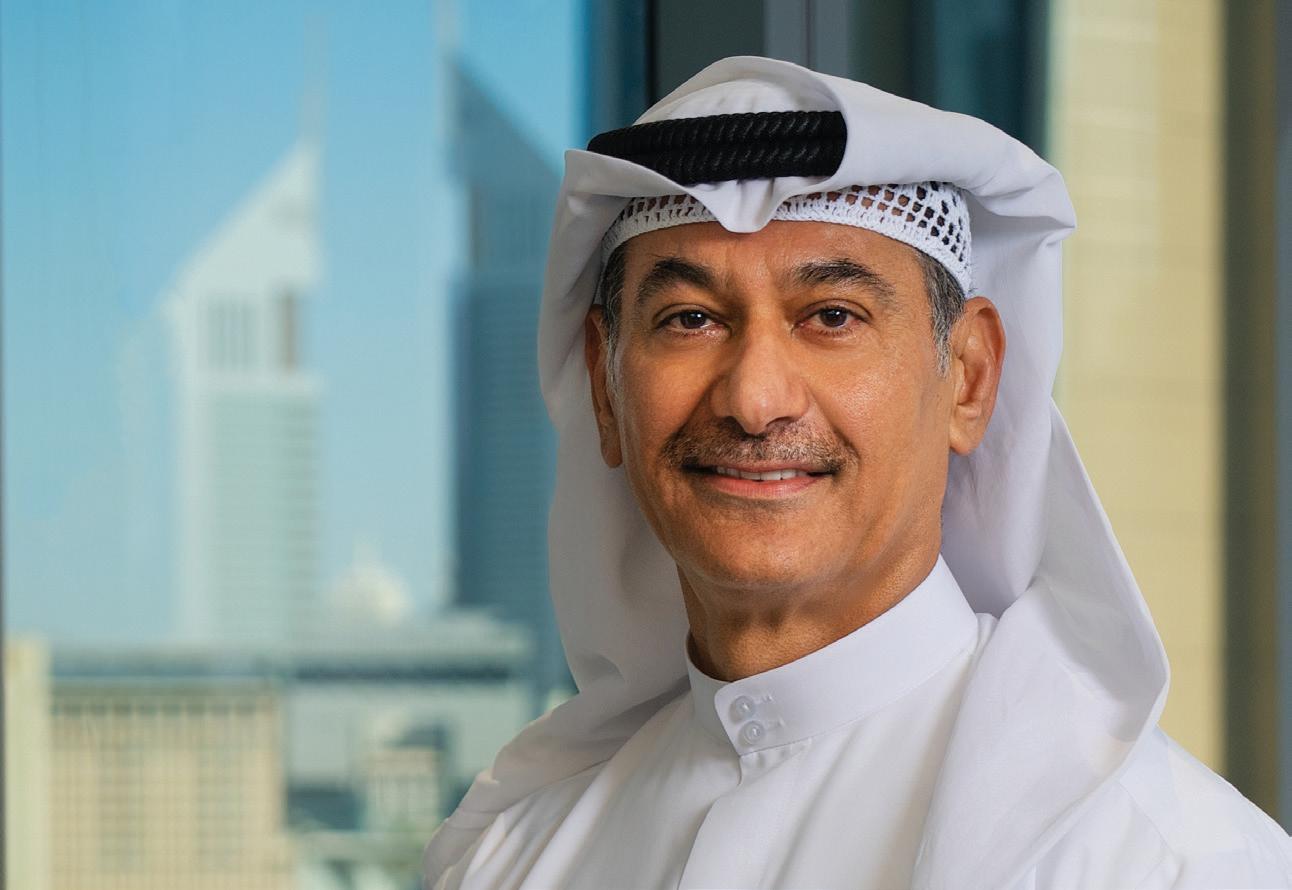

THE INNOVATION ADVANTAGE
GCC leaders can bolster progress by embracing innovative approaches

LEAD WITH GRACE
Top Emirati female execs share insights on success and leadership
HEAD OFFICE: Media One Tower, Dubai Media City, PO Box 2331, Dubai, UAE, Tel: +971 4 427 3000, Fax: +971 4 428 2260, motivate@motivate.ae
DUBAI MEDIA CITY: SD 2-94, 2nd Floor, Building 2, Dubai, UAE, Tel: +971 4 390 3550, Fax: +971 4 390 4845
ABU DHABI: PO Box 43072, UAE, Tel: +971 2 677 2005, Fax: +971 2 677 0124, motivate-adh@motivate.ae
LONDON: Acre House, 11/15 William Road, London NW1 3ER, UK, motivateuk@motivate.ae
Cover: Freddie N Colinares
Editor-in-chief
Obaid Humaid Al Tayer
Managing partner and group editor Ian Fairservice
Chief commercial officer
Anthony Milne anthony@motivate.ae
Publisher
Manish Chopra manish.chopra@motivate.ae
EDITORIAL
Group editor
Gareth van Zyl Gareth.Vanzyl@motivate.ae
Editor
Neesha Salian neesha@motivate.ae
Senior feature writer
Kudakwashe Muzoriwa Kudakwashe.Muzoriwa@motivate.ae
Senior art director
Freddie N. Colinares freddie@motivate.ae
General manager – production
S Sunil Kumar
Production manager Binu Purandaran
Production supervisor
Venita Pinto
Senior sales manager
Sangeetha J S Sangeetha.js@motivate.ae
Digital sales director
Mario Saaiby mario.saaiby@motivate.ae
Group marketing manager
Joelle AlBeaino joelle.albeaino@motivate.ae

PROFESSIONAL QUALIFICATIONS NOT ONLY EQUIP INDIVIDUALS WITH THE NECESSARY SKILLS TO THRIVE IN A COMPETITIVE LANDSCAPE BUT ALSO CONTRIBUTE TO THE REGION’S OVERALL ECONOMIC GROWTH
he Middle East economies’ ambitious transformation agenda requires a highly skilled, qualified and adaptable workforce to turn vision into reality. The regional governments recognise this and have put bold strategies into motion to build a locally fostered, world-class talent pool. National initiatives such as Saudi Arabia’s Human Capital Development Program (HCDP) and UAE’s NAFIS champion a new era of human capital development, with a strong emphasis on professional qualifications (PQs) to boost citizens’ employability and life-long skills building. Professional qualifications equip individuals with the advanced knowledge, skills and competencies needed to excel in the evolving economic landscape, and are essential for building the capable and versatile workforce necessary to realise the transformation aspirations.
PwC’s Middle East Workforce Hopes and Fears Survey 2023 highlights the urgency of this mission – 52 per cent of employees expect significant changes to their roles in the next five years, highlighting a pressing need for upskilling. Amidst talent shortages and market shifts, more and more organisations are laying emphasis on a professionally qualified workforce as a strategic enabler. These globally recognised credentials not only equip local talent with the skills to compete globally but also boost workforce productivity and, ultimately, business profitability.
52% OF EMPLOYEES EXPECT SIGNIFICANT CHANGES TO THEIR ROLES IN THE NEXT 5 YEARS , HIGHLIGHTING A PRESSING NEED FOR UPSKILLING, SHOWS STUDY
They equip professionals with ‘best practice’ knowledge and standardised skills, crucial for success in today’s globally competitive business landscape. More importantly, most qualifications mandate real-world professional experience for accreditation. For example, in addition to clearing the exams, Association of chartered certified accountants (ACCA) and chartered financial analyst (CFA) candidates must complete thre years of relevant work experience to earn the coveted membership to the respective professional body. This ensures that qualified professionals possess the practical skills and experience necessary to tackle complex challenges in their areas of specialisation and deliver real value to their organisations.
A professionally qualified workforce is critical to a globally competitive economy. Be it adhering to IFRS standards, operating in the new tax regime and aligning to the new ESG global standards – professionals with the right skill-set and experience are in demand in the region’s public and private sectors. A professionally qualified workforce meets these global benchmarks, guaranteeing businesses have the expertise they need. The rigorous nature of accreditations, like the CFA, with its relatively low pass rates, means that employers hiring CFA charter holders are securing professionals of the highest calibre.
Hiring professionally qualified talent enables the private and public sector to realise the national goal of building knowledge economies. This commitment to talent development and excellence across sectors positions the region as an attractive destination for talent and
A PROFESSIONALLY QUALIFIED WORKFORCE IS
CRITICAL
TO A GLOBALLY COMPETITIVE ECONOMY. BE IT ADHERING TO IFRS STANDARDS, OPERATING IN THE NEW TAX REGIME, ALIGNING TO THE NEW ESG GLOBAL STANDARDS - PROFESSIONALS WITH THE RIGHT SKILL-SET AND EXPERIENCE ARE IN DEMAND IN THE REGION’S PUBLIC AND PRIVATE SECTOR.”
innovation, further boosting global competitiveness. This also enhances nationalisation efforts by empowering local talent. For example, Saudi Arabia’s Human Resource Development Fund (Haddaff) sponsors the CIPD qualification, amongst others, for Saudi Nationals to promote a skilled HR practitioner workforce.
By equipping the region’s workforce, both nationals and expats, with the skills and knowledge demanded by the global market, organisations create a steady talent pool that is both diverse and highly capable.
While these qualifications typically require additional years of study, many offer flexible pathways that allow individuals to study while they work. Also, today’s learners want flexible, accessible learning that fits their lives. They can find short and long-term qualifications suitable to the area of specialisation in finance, HR, digital, tax, project management, procurement and more. Professionals at any career stage can easily find the right training to enable the next step in their career progression.
Being professionally qualified means embracing lifelong learning. By joining a community of professionals committed to development, individuals can network, share knowledge, and continuously grow.
The Middle East’s investment in PQs is a strategic move to build a worldclass workforce. It’s about credibility, guarantee, and relevance – not just new skills. It enables long-term organisational growth and empowers individual aspirations. This dual benefit positions PQs as the future of learning and workforce development powering the region’s ambitions. L
The author is the PwC Partner and PwC’s Academy Middle East Professional Qualifications Head.
ulf Cooperation Council (GCC) countries are undergoing a period of significant transformation. Traditionally dependent on oilbased economies, these nations have begun diversifying their economic models, focusing on sectors like technology, finance, tourism, and renewable energy. As they push towards becoming knowledge-based economies, one of the key enablers of this transition is innovation. Innovation is not just about adopting new technologies; it requires a shift in organisational culture, investment in R&D, talent development, and an emphasis on digitalisation. Despite the growing emphasis on innovation, the majority of the leaders in the GCC face several unique challenges in driving it within their organisations due to a combination of socio-cultural, economic, and political factors. With the right strategies and learning from other successes elsewhere, they can overcome these hurdles and incubate environments where innovation thrives.
This has been one of the most significant challenges to driving innovation in the GCC. Historically, the region’s oil wealth has led to the development of economies where predictability and stability were prized over disruptive innovation. This has made many organisations resistant to change, particularly in banking and government services, where traditional ways of operating have proven successful for decades. Additionally, hierarchical structures emphasise top-down decision-making. Employees defer to senior management for approval on most initiatives, which stifles creativity and experimentation at lower levels. To break through this barrier, leaders must promote a culture of experimentation and calculated risktaking. One way to do this is by setting up innovation labs or sandboxes within organisations. These are safe spaces where employees can test new ideas, processes, and technologies without the fear of failure. For instance, Dubai Future Accelerators, launched by the Dubai government, provided a platform for innovators and entrepreneurs to collaborate with government entities and test their solutions in real-world environments. Also, leaders can encourage bottom-up innovation by empowering middle management and employees to make decisions. Companies like Saudi Aramco have started implementing more horizontal decision-making frameworks to drive a sense of ownership among employees and reduce bureaucratic bottlenecks.
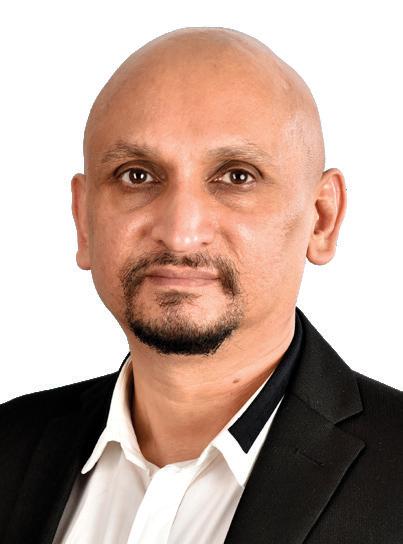
Historically, investment in R&D in the GCC has been low compared to other regions, such as the US, Europe, or East Asia. According to UNESCO, the average R&D expenditure as a percentage of GDP in GCC countries is around 0.5 per cent, far lower than the global average of 2.2 per cent. Without adequate investment in R&D, it becomes difficult for organisations to build breakthrough innovations, especially in high-tech sectors.
One way for leaders to overcome this problem is by initiating public-private partnerships (PPPs) and collaborations with international research institutions. Governments across the GCC have started to recognise the need for increased R&D; they are working to attract multinational corporations, startups and academic institutions to set up innovation hubs in the region. For example, KAUST (King Abdullah University of Science and Technology) in Saudi Arabia has been a catalyst for driving research and innovation in the country. By collaborating with global universities and corporations, KAUST has created an ecosystem where R&D is thriving. Leaders in the private sector can tap into these resources, partnering with academic institutions and benefiting from their cutting-edge research to drive product and process innovations. Governments are also stepping up with initiatives to promote R&D. Qatar Science & Technology Park (QSTP) and Masdar City in Abu Dhabi are examples of how public investment is being directed toward innovation and sustainable development. Organisations operating within these ecosystems are exposed to the latest technologies and can leverage shared resources to innovate.
A growing challenge is the lack of a skilled local workforce in crucial areas like technology, engineering, data science, and artificial intelligence. Despite a growing focus on education and upskilling, many GCC countries still rely heavily on expatriate talent for knowledge-intensive roles. This

dependence poses risks, particularly in times of global disruption, such as during the Covid-19 pandemic, when mobility restrictions made it difficult to attract and retain foreign talent.
Leaders must focus on developing local talent through education and continuous learning programmes. National governments are already taking steps in this direction through ambitious policies such as Saudi Arabia’s Vision 2030 and UAE’s Centennial 2071 initiatives, which emphasise human capital development and the creation of a knowledge-based economy.
Organisations must also invest in corporate training programmes to upskill their current workforce, particularly in areas like data science, AI, and robotics. For instance, Emirates Group has invested heavily in training its employees in digital skills, recognising that a workforce adept in digital technologies will be key to staying competitive in the future. Similarly, Bahrain’s Economic Development Board is working to position the country as a hub for financial technology (fintech) by providing targeted training and educational programmes in blockchain and digital banking.
Encouraging entrepreneurship is another way to cultivate talent locally. Countries like Oman and Kuwait are increasingly promoting entrepreneurship by providing grants, incubation services, and mentorship programmes for startups. A strong entrepreneurial culture can generate home-grown innovations and create a pipeline of skilled, adaptable talent.
Regulatory frameworks in some countries can be complex and slow to adapt to the fast-changing nature of innovation, particularly in industries like fintech, healthcare and e-commerce. Managing these bureaucratic hurdles can be time-consuming and may deter companies from launching innovative products or adopting cutting-edge technologies.
Governments in the GCC must recognise the need for regulatory reforms to drive innovation. Several countries have introduced regulatory sandboxes that allow companies to test new technologies and business models in a controlled environment, free from some of the usual regulatory constraints. For example, Bahrain’s Central Bank has set it up specifically for FinTech companies. This initiative has enabled companies to develop and test new financial products like digital wallets, cryptocurrency platforms, and blockchain solutions without facing the usual regulatory challenges. Similarly, Saudi Arabia’s Capital Market Authority (CMA) has
implemented a sandbox for testing new financial technologies, helping to stimulate growth in its FinTech sector.
Leaders in the private sector can leverage such initiatives to experiment with new products and services, ensuring they comply with regulations while driving innovation. On their part, government bodies need to continue adopting agile policy-making, keeping pace with technological advancements and creating an enabling environment for businesses to thrive.
In a region where tradition and modernity often coexist, leaders will face resistance promoting innovation even without alienating traditional segments of society. For example, cultural norms and expectations can shape consumer behaviour, influencing the adoption of new technologies or business models.
To balance the two forces, leaders must approach change with cultural sensitivity. A successful example of this approach is Noon, an e-commerce platform that was designed specifically for the Middle Eastern market.
Recognising that consumer habits and expectations in the GCC differ from those in Western countries, Noon focused on adapting its offerings to local tastes, emphasising cash-on-delivery options, and ensuring culturally appropriate marketing campaigns. This allowed them to innovate in a way that respected traditional consumer preferences.
The journey toward becoming innovation-driven economies will require not only technological advancement but also a cultural shift within organisations and society as a whole. By following the above pointers, leaders can position the GCC as a global leader in innovation and economic diversification in the 21st century. L The writer is the co-founder of the nonprofit Medici Institute for Innovation.

BY BEING TRANSPARENT ABOUT THE COMPANY’S ISSUES AND TURNAROUND STRATEGY, YOU CAN CULTIVATE THE ESSENTIAL TRUST AND COMMITMENT NEEDED TO MAKE THE NECESSARY CHANGES


hen a company is in trouble, it takes something special to turn it around. One study shows that approximately 30 per cent of all large organisations are seeing significant drops in performance, while at the same time, only 20 per cent of turnaround attempts are successful. These are worrying numbers.
So, how can a successful outcome be achieved? The first step is identifying that the organisation is in a phase of decline.
This may be indicated by a long period of low performance, financial issues, or external factors such as an economic downturn or new competition entering the market. The second step is to take swift but well-planned action, and I’ll share more about this in detail here.
Here, we will look at how two of the world’s biggest firms – IBM and Apple – have both navigated significant turnarounds and while they are both giant organisations, there is much to learn from these examples for the entrepreneur or small business owner.
The decision to initiate a corporate turnaround should not be taken lightly. It requires a clear-eyed assessment of the company’s current standing and a willingness to acknowledge that continuing down the same path could lead to decline or even failure.
Senior management or owners may be unwilling to acknowledge this reality, making it imperative for an incoming CEO to execute the plan effectively to steer the struggling company back on course.
Before tackling the tasks at hand, it’s crucial to acknowledge the looming pressure from various directions to expedite the turnaround process. Therefore, my initial suggestion is to refrain from panicking. Secondly,
A METHODICAL AND STRATEGIC APPROACH IS REQUIRED, MAINTAINING ONGOING ENGAGEMENT AND COMMUNICATION WITH STAKEHOLDERS THROUGHOUT THE PROCESS. BY BEING TRANSPARENT ABOUT THE COMPANY ’S CHALLENGES AND TURNAROUND STRATEGY, YOU CAN CULTIVATE THE ESSENTIAL TRUST AND COMMITMENT NEEDED TO MAKE THE NECESSARY CHANGES.”
avoid attempting to tackle every aspect simultaneously. A methodical and strategic approach is required, maintaining ongoing engagement and communication with stakeholders throughout the process.
By being transparent about the company’s challenges and turnaround strategy, you can cultivate the essential trust and commitment needed to make the necessary changes.
Let’s look at a step-by-step process that would fit within any turnaround strategy:
Start with strategy: Conduct a thorough examination of the company’s strategic framework, encompassing its mission, vision, and long-term objectives. This may entail refining target markets, revitalising product offerings, or adopting innovative business models.
Review operations: Identifying and rectifying inefficiencies is paramount. This could involve optimising processes, integrating advanced technologies, or enhancing supply chain management.
Restructure finances: Actions such as renegotiating debts, pursuing fresh investments, or moving resources towards more lucrative ventures are vital for financial stability.
Work on company culture: This is about cultivating a culture o f urgency, nurturing innovation, and aligning the workforce with the revised strategic trajectory. In short, getting everyone on board with the proposed changes will help bolster company morale.
It’s useful to look at how those key steps play out in real-life scenarios, starting with a company that has been around for more than 100 years: IBM.
The organisation was dealing with all kinds of challenges in the late 1980s and early 1990s, facing intense competition, outdated business practices, and technological shifts. After innovating for so many years, IBM was soon lagging behind. Lou Gerstner came in as CEO in 1993 and implemented a series of bold
strategies. Among these was a shift towards services, particularly consulting, IT services, and software. This was a significant move away from the company’s traditional hardware business. Gerstner also streamlined operations by cutting costs, instigating layoffs and restructuring.
He also moved the company to a more customer-centric approach, pivoting away from proprietary systems and embracing open standards. By the end of the 1990s, IBM had returned to profitability and regained its position as a leading player in the technology industry. It should be noted, too, that it wasn’t just what Gerstner did, but also how he led his team. It takes a strong figure to lead such a significant turnaround of any company, particularly a multi-national organisation with such a rich history.
Now let’s turn our attention to Apple and its resurgence under Steve Jobs’ stewardship. Upon his return to the company in 1997, Apple faced bankruptcy, prompting Jobs to streamline operations and refocus on innovative, high-quality products that resonated with consumers.
Jobs’ leadership also included crucial financial manoeuvres, securing investments and restructuring debts to stabilise the company’s finances. This action bolstered investor confidence and provided a solid foundation for future growth.
By revitalising Apple’s culture of innovation, groundbreaking products emerged such as the iMac, iPod, iPhone, and iPad, all of which reinvigorated the company’s brand and re-established its reputation as an industry pioneer.
Both Gerstner and Jobs provided invaluable lessons on successfully rescuing a company from the brink of failure. Gerstner’s tenure at IBM and Jobs’ turnaround of Apple highlight key principles essential for corporate revival.
Firstly, both leaders emphasised the importance of strategic vision and bold decision-making. Gerstner redefined IBM’s focus on services, while Jobs streamlined Apple’s product line, demonstrating the necessity of aligning strategies with market demands.
Secondly, the two leaders prioritised operational efficiency and organisational culture. Gerstner streamlined IBM’s operations and fostered a culture of excellence, while Jobs instilled a culture of innovation at Apple. These actions are a great example of optimising internal processes and nurturing a cohesive and well-motivated workforce.
BEFORE TACKLING THE TASKS AT HAND, IT’S CRUCIAL TO ACKNOWLEDGE THE LOOMING PRESSURE FROM VARIOUS DIRECTIONS TO EXPEDITE THE TURNAROUND PROCESS
Thirdly, financial restructuring played a pivotal role. You can’t do anything if your finances are not in order. Gerstner’s negotiations and investments stabilised IBM’s finances, while Jobs secured investment and restructured debts for Apple.
Sound financial management was crucial in restoring investor confidence and ensuring long-term sustainability.
Lastly, effective communication was key, whether that was internal or external. Both these leaders articulated their companies’ visions to their various audiences, rallying stakeholders behind their strategies and speaking to customers in a way they understood.
Company turnarounds pose significant challenges but can bring rewarding outcomes. Effective leadership is paramount for tough decision-making and inspiring others to embrace change.
Although the examples of Jobs and Gerstner provide valuable insights, similar challenges are prevalent among companies worldwide. In the UAE, recent examples include Union Properties and Amlak, both undergoing corporate and debt restructuring.
Following these transformations, both entities have experienced significant financial improvements, with Amlak’s shares surging over 25 per cent and Union Properties witnessing a 12 per cent increase.
Whether drawing from the experiences of global leaders like Gerstner or Jobs or observing successes closer to home, it’s clear that guiding a struggling company through adversity towards a prosperous future is achievable. L
The writer is head of revenue and strategy at SPC Free Zone.

KEY STRATEGIES THAT LEADERS CAN USE TO ENSURE THEIR BUSINESSES ARE MORE AGILE AND INNOVATIVE
The Middle East is at an exciting inflexion point, poised to enjoy a significant period of accelerated growth.
According to the World Bank, the region’s GDP is projected to outpace the global average by 1.5 per cent over the next five years, buoyed by visionary leaders with sky-high ambitions – from Saudi Vision 2030 to We the UAE 2031.
Earlier this year, as part of Russell Reynolds Associates’ Global Leadership Monitor, we surveyed 2,700 business leaders in over 40 countries: board directors, CEOs, C-suite executives, and next-generation leaders. When we asked them to name the top threats to their business, only 51 per cent of Middle Eastern leaders cited


economic uncertainty versus 64 per cent globally. Only 42 per cent in the Middle East cited technological change, compared to 53 per cent globally.
These numbers tell us that business leaders across the Middle East are less worried about the twin threats of technological disruption and economic uncertainty than their global counterparts. They are forward-thinking. They are embracing the latest technology, such as artificial intelligence. And they are ready to deploy capital to see their boldest plans through to fruition.
But thriving in this brave new world will require bold changes in leadership styles.
To be innovative, you need to be agile and cut through bureaucracy, and you need to foster the right kind of culture, where people are open, fearless and empowered to take (calculated) risks and make tough decisions.
Here are three things leaders can do to ensure their businesses are more agile and innovative, at this pivotal moment of opportunity.
Traditionally, businesses in the Middle East have tended to be hierarchical in structure, and
conservative in approach. Recently, we’ve seen a noticeable shift at the board and CEO levels to adopt more modern and flexible styles of leadership.
Yet, despite advancements at the highest ranks, this appetite for innovation, allowing failures and risk-taking hasn’t always trickled down to the lower rungs of the corporate ladder.
This matters, because hierarchy is the enemy of agility, collaboration and speed. In hierarchical organisations, leaders below the CEO hesitate to make decisions, because they’re scared of making mistakes and upsetting those above them. This means crucial decisions can only be taken by those at the top, which inevitably slows everything down. Left unchecked, this can create an ‘execution gap’ between the bold visions coming from the CEO, and what happens on the ground.
To counter this, it can be helpful to empower leaders further down the

DIVERSITY IS THE LIFEBLOOD OF INNOVATION, AND IT STARTS WITH YOUR BOARD. WHEN YOUR BOARD IS FILLED WITH PEOPLE WHO ALL THINK, ACT, AND SEE THE WORLD THROUGH THE SAME LENS, IT LEADS TO ‘GROUPTHINK’ —ESPECIALLY WHEN THE BOARD IS DOMINATED BY MEMBERS WITH THE SAME BACKGROUND AND EXPERIENCE.”
WOULD BE READY TO TAKE A JOB AT A DIFFERENT ORGANISATION IMMEDIATELY – AND THEIR NUMBER ONE REASON IS A LACK OF CAREER PROGRESSION
‘food chain’ to think and act for themselves—without fear of reprisal, should things go wrong. To innovate, you have to be prepared to fail and learn. You need to let people know they have your permission to innovate.
Another key finding from the monitor is that 69 per cent of leaders in the Middle East would be ready to take a job at a different organisation immediately — and their number one reason is a lack of career progression.
In a competitive talent landscape, the best organisations are those that invest heavily in the development of their internal talent. Encouragingly, we’re seeing more investment in leadership development across the Middle East. Rather than hiring and firing, there is a growing focus on nurturing the next generation of local leaders, family members or expatriates into the organisation, with investments to make sure they are
ready for their current role and are prepared for the next step.
This is a positive shift. Investing in talent development is a critical first step towards creating a more resilient, forward-thinking and proactive organisation. To keep pace with global trends in a fast-changing world, you need to instil a culture of continuous learning and belonging.
Diversity is the lifeblood of innovation, and it starts with your board. When your board is filled with people who all think, act, and see the world through the same lens, it leads to ‘groupthink’—especially when the board is dominated by members with the same background and experience. We know from both our research and our professional experience that diverse boards make better decisions and drive better outcomes. That may include adding more independent members to the board.
At the same time, it’s important to be clear about where the balance of power lies between the board and the C-suite.
The role of the board should be to approve the strategy, not to set it. The role of the board should be to encourage and support cultural transformation, not drive it.
While board governance is improving, it needs to change faster. The efficiency of board and committee meetings, the selection of independent board members, and the quality and diversity inside the boardroom can all be improved, but it will take time. Those who embrace and accelerate this change now can gain a crucial competitive advantage over their rivals, at this pivotal moment of opportunity. L
Nicolas Manset is the head of the Middle East, and Jan Cron is the managing director and partner at Russell Reynolds Associates.
ESTABLISHED IN 1989, AL TAMIMI & COMPANY HAS GROWN FROM A SINGLE OFFICE IN SHARJAH TO BECOME THE LARGEST LAW FIRM IN THE MIDDLE EAST. IN THIS FEATURE, WE EXPLORE THE FIRM’S JOURNEY OVER THE PAST 35 YEARS, FROM ITS INCEPTION TO ITS VISION FOR THE FUTURE, LED BY ITS FOUNDER AND CHAIRMAN, ESSAM AL TAMIMI.
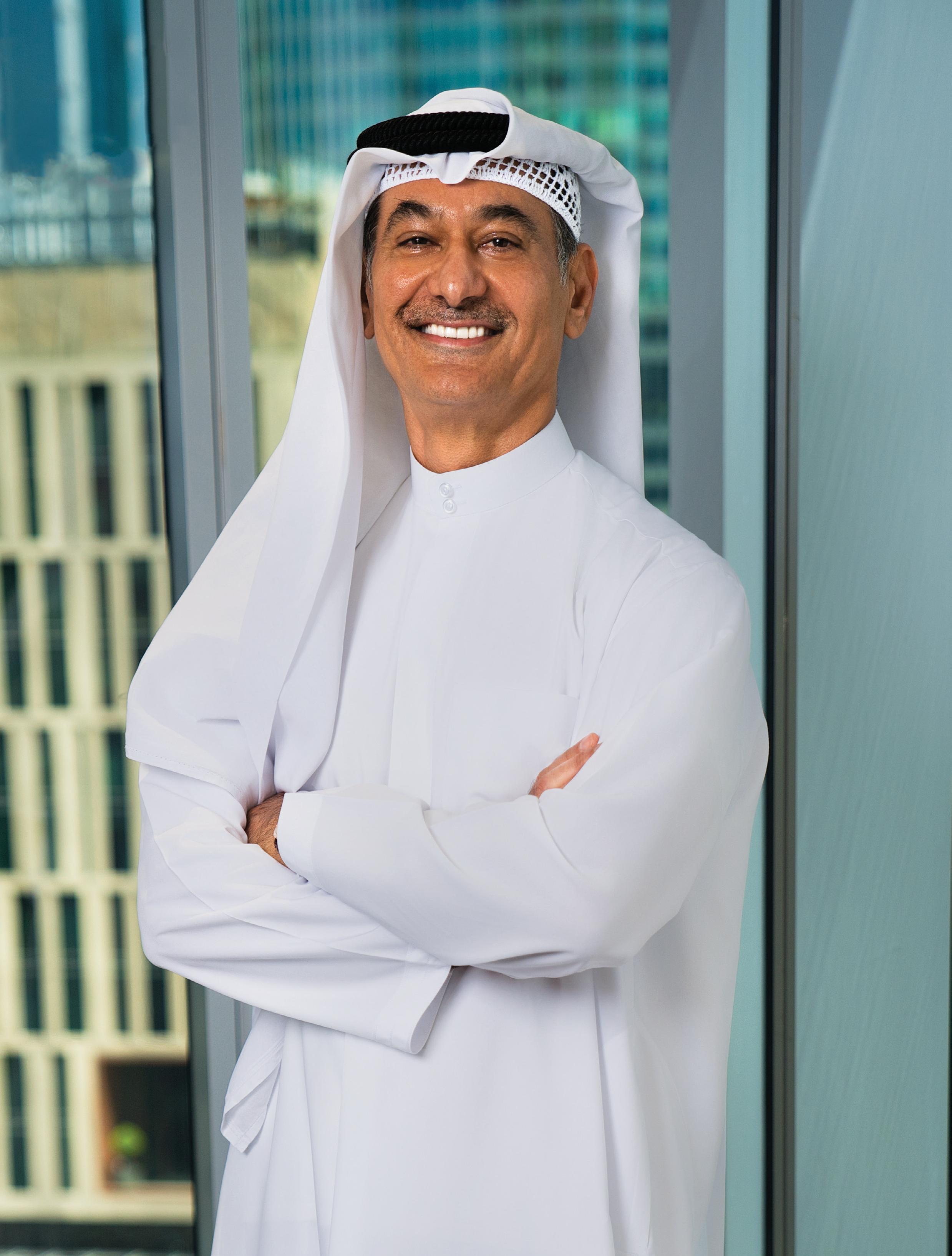
n 1989, Essam Al Tamimi saw an opportunity in Sharjah.
“I wanted to create a law firm that would set a new standard for legal services in the region,” he recalls.
The UAE was experiencing significant economic growth, and the legal infrastructure was still evolving.
Al Tamimi’s ambition was to address local needs while aligning with international best practices.
“My vision was clear,” Al Tamimi says, “to establish a firm that not only addressed the local needs but also aligned with international best practices. While I knew we had the potential to grow significantly, the journey to becoming the leading law firm in the Middle East is a testament to our strategic focus and dedication to excellence.”
From that first office in Sharjah, Al Tamimi & Company set out to reshape the legal landscape of the UAE. Today, with offices across 10 countries in the Middle East, the firm provides a comprehensive range of legal services, reflecting the ambitious vision with which it began.
“Our presence has grown alongside the region’s own growth,” Al Tamimi notes.
“We have offices that have been in Kuwait for 15 years, Bahrain for 10 years, and longer in Qatar and Iraq. Each office replicates our culture, vision, and drive — whether in Oman, Egypt, or Saudi Arabia.”
Over the past three and a half decades, the UAE has experienced profound legal changes — and Al Tamimi & Company has been a major player in that transformation.
“The UAE’s legal landscape has transformed dramatically, with new regulations, sectors, and a focus on international standards,” Al Tamimi explains.
Ever since its inception, the firm’s contributions include working with government bodies to ensure the legal framework supports the country’s growth and diversification.
Al Tamimi highlights the firm’s role in shaping the legal environment, emphasising its involvement in legislative reforms.
“We’ve worked closely with government bodies and businesses to ensure that the legal framework supports the UAE’s vision for growth and diversification.” This involvement has positioned Al Tamimi & Company as a key partner in the UAE’s rapid development.
Reflecting on the legal landscape of the past, Al Tamimi says, “It’s really a story of a lifetime.
“What happened in this region — from infrastructure to the legal system — has been truly impressive. Many outdated laws from the 1980s were replaced to better serve the 21st century, and we played a role in that transformation.”
The firm has also been instrumental in modernising the country’s legal system, making it easier for international investors to conduct business.
“We’ve contributed to drafting laws and regulations that were state-of-the-art. That was not by accident — governments here have realised the importance of creating an innovative and supportive business environment. Unless you’re ahead of the game,
“TODAY, WE’RE INVESTING HEAVILY IN UNDERSTANDING RENEWABLE ENERGY, AI, AND NEW TECHNOLOGIES, WHICH ARE THE AREAS THAT DEMAND OUR ATTENTION.”
you can’t succeed or attract investments, and this is something we deeply understand,” Al Tamimi adds.
Al Tamimi goes on to say that laws it has shaped include those concerning financial regulation, commercial transactions, and intellectual property, aligning the region’s legal standards with international expectations. These efforts have not only benefited the firm’s clients but also helped transform the UAE into a global business hub.
Al Tamimi & Company has also evolved its sector focus over the years.
Today, the firm provides legal expertise across industries such as construction, energy, technology, and healthcare.
“We currently focus on sectors such as construction, energy, technology, and healthcare,” says Al Tamimi.
He notes that the firm’s agility in adapting to market changes is one of its strengths.
“As the market evolves, we’re seeing increased demand in areas like technology and sustainable development. Our strategy involves staying agile and adapting to these changes to provide our clients with the best legal solutions.”
The firm’s sector-specific expertise has allowed it to stay ahead of the curve and serve clients effectively in an ever-changing economic landscape.
“In the early 1990s, intellectual property, copyrights, and construction were our main areas of focus because that’s what the market needed then. But today, we’re investing heavily in understanding
17 OFFICES
10 COUNTRIES
100+ PARTNERS
420+ LAWYERS
550+ LEGAL PROFESSIONALS
1,000+ EMPLOYEES
60+ NATIONALITIES
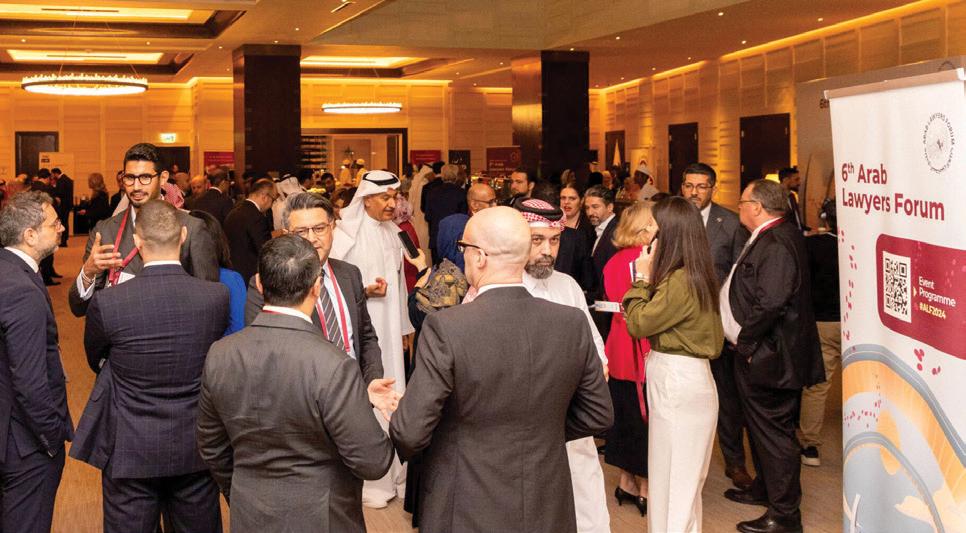
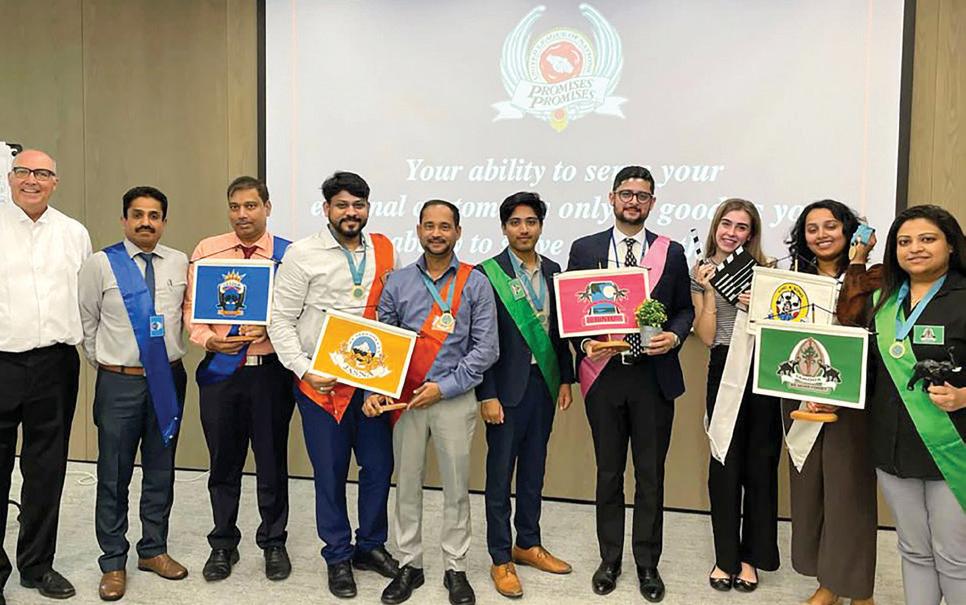
renewable energy, AI, and new technologies, which are the areas that demand our attention,” Al Tamimi elaborates. Al Tamimi & Company further assists global and family businesses with setting up in the UAE. It also helps global businesses with mergers and acquisitions.
In recent years, Al Tamimi & Company has embraced technology to enhance its services and streamline operations.
“We are committed to leveraging technology to enhance our services and streamline operations,” Al Tamimi states.
The firm’s investment in developing its own AI solutions reflects its belief in innovation as a key driver of efficiency and client satisfaction.
“By integrating advanced technology, we empower our team to focus on delivering exceptional value while ensuring we stay ahead in a competitive landscape.”
“Technology is transforming industries, and the legal field is no exception,” Al Tamimi says.
“We’ve invested heavily in our infrastructure — our use of AI allows us to provide services more efficiently and at a lower cost, which benefits our clients. We’re not just using off-the-shelf programmes; we’re actively contributing to AI development to ensure it meets the needs of the Middle East market.”
The firm’s proactive approach to technology also extends to its internal processes.
“We’re applying AI beyond legal research — we’re using it in HR, finance, and operations. This not only improves efficiency but also aligns with our goal of being environmentally friendly,” Al Tamimi notes.
But more important than its adoption of new technologies is the firm’s strong belief in looking after its staff.
Here, diversity is a key cornerstone of Al Tamimi & Company’s approach.
DEFENCE & SECURITY
EDUCATION
ENERGY & RESOURCES
FINANCIAL SERVICES
HEALTHCARE & LIFE SCIENCES
HOTELS & LEISURE
REAL ESTATE & CONSTRUCTION
RETAIL & CONSUMER
SPORTS & EVENTS MANAGEMENT
TECHNOLOGY, MEDIA & TELECOMMUNICATIONS
TRANSPORT & LOGISTICS
MERGERS & ACQUISITIONS
GLOBAL & FAMILY OFFICE SET-UP
“We believe that a diverse workforce enhances creativity and problem-solving,” Al Tamimi explains.
The firm prioritises hiring individuals from a wide range of backgrounds and cultures, fostering an inclusive work environment.
“This diversity is crucial in the legal field as it allows us to better understand and serve our diverse clientele.”
The emphasis on diversity is not just about meeting societal expectations; it is a business imperative that ensures the firm can provide well-rounded perspectives and solutions to its clients.
“The UAE is a diverse country — everyone who comes here feels they belong, and we’ve adopted the same approach at Al Tamimi. Our partners and employees come from North America, Australia, Asia, and the Middle East, and this mix is crucial for understanding our clients’ needs,” he notes.
“WE HAVE OFFICES THAT HAVE BEEN IN KUWAIT FOR 15 YEARS, BAHRAIN FOR 10 YEARS, AND LONGER IN QATAR AND IRAQ. EACH OFFICE REPLICATES OUR CULTURE, VISION, AND DRIVE WHETHER IN OMAN, EGYPT, OR SAUDI ARABIA.”
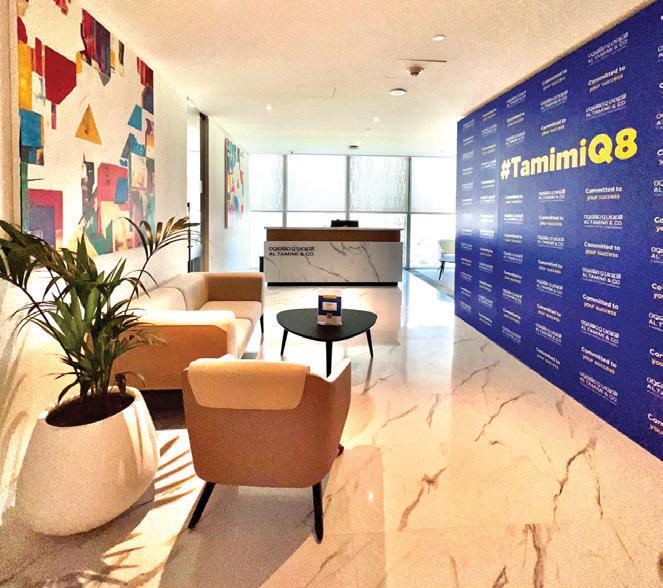
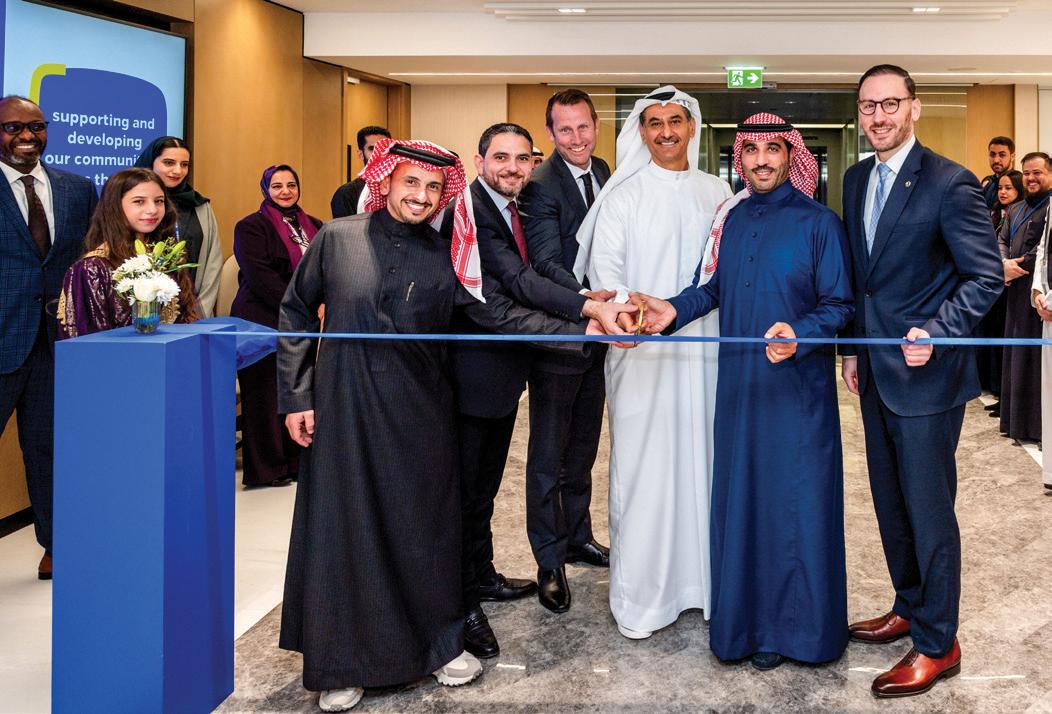
The firm also boasts a diverse leadership team, with men and women from various nationalities holding senior positions.
“There’s no glass ceiling — everyone here grows based on performance, and nationality doesn’t matter,” Al Tamimi emphasises.
Another significant element of Al Tamimi & Company’s approach is its focus on education and professional development.
That’s why the company launched the Al Tamimi Academy, which seeks to nurture the next generation of legal professionals in the region by providing educational resources, mentorship, and practical training.
The academy offers a variety of programmes designed to equip aspiring lawyers with the skills they need to thrive in a rapidly changing legal environment.
“Our goal is to ensure that aspiring lawyers have the tools and knowledge they need to succeed. We believe that investing in education is essential for the future of the legal profession in the region,” Al Tamimi tells Gulf Business
Al Tamimi & Company even goes as far as providing scholarships, where possible.
“We currently offer scholarships especially for people in need from different backgrounds and nationalities. It brings us joy, and sometimes we discover excellent talent who later join Al Tamimi & Company. We work closely with universities to share our knowledge and enhance their legal education, and we collaborate with them almost monthly,” he adds.
It’s not just with universities that Al Tamimi & Company shares knowledge.
An often-overlooked aspect of Al Tamimi & Company’s growth has been its dedication to sharing legal knowledge with the broader community. The firm’s monthly publication, Law Update, has been a fixture for 33 years.
“I actually started typing this at home on a typewriter when we were just four lawyers,” Al Tamimi recalls.
“The idea was to provide the community — both local and international — with updates on new laws, court judgments, and
1989: Essam Al Tamimi opens the first office of Al Tamimi & Company in Sharjah in January 1989, supported by one secretary. In July 1989, the firm opened its second office in the World Trade Centre in Dubai with five lawyers.
1991: In April, the first edition of Law Update, the firm’s client newsletter, is published.
1994: The firm expands further in the UAE with the launch of an office in Abu Dhabi, bringing the total number of lawyers to ten.
2002: Al Tamimi launches an office in Dubai Internet City to serve a new client base.
2005: Expansion continues with the launch of an office in Baghdad, Iraq.
2006: A milestone is reached with the launch of an office in the Dubai International Financial Centre (DIFC), which became the firm’s head office.
2008: Offices opened in Amman, Jordan, and Riyadh, in Saudi Arabia. Later that year, the firm broadened its services in Qatar with an office in the Qatar Financial Centre in Doha.
2009: A joint venture with Attorney Yaqoub Yousef Al-Munayae leads to the opening of an office in Kuwait.
2012: An office is launched in Ras Al Khaimah (RAK) to cater to clients in the Northern Emirates.
2013: With 10 offices in six countries, the firm expands its footprint in Iraq with offices in Erbil and Basra.
2014: Celebrating 25 years in the Middle East, the firm expands further with new offices in Bahrain and Oman.
2015: Offices opened in Cairo, Egypt, and Jeddah, Saudi Arabia, bringing the total number of offices in the Middle East to 16 across nine countries.
2016: The firm celebrates 25 years of Law Update and launches an office in Al Khobar, KSA.
2017: Expansion continues with 17 offices in nine countries, 60 partners, 330 lawyers, and 720 staff members from 45 nationalities.
2019: The firm celebrates its 30-year anniversary.
2021: A second office is opened in Port Said, Egypt.
2022: Al Tamimi enhances regional presence with the expansion of service offerings and strategic initiatives.
2023: The firm expands its capabilities by investing in innovative technology and strengthening client relationships.
2024: Al Tamimi completes its 35th anniversary, marking three and a half decades of delivering exceptional service and results to its clients.
legal developments. It was about filling a gap in the market and ensuring people had the information they needed.”
Today, Law Update is published both in hard copy and electronically, providing valuable insights into legal developments across the region.
“This publication is an extension of our commitment to education and community engagement. We have not missed a single month since we started, and I’m incredibly proud of that,” Al Tamimi adds.
Al Tamimi’s leadership style has been described as approachable; a quality that has helped shape the culture of the firm. He is legendary in the firm for being available on his phone and is known to spark conversations with staff while in his company’s offices.
“I believe that leadership is about collaboration and open communication,” he says. “By being approachable, I encourage team members to share their ideas and concerns. This creates a supportive culture where everyone feels valued.”
This approach has fostered a culture of shared leadership and accountability at Al Tamimi & Company. “Balancing leadership with empowerment involves delegating responsibilities and trusting my team to take ownership of their work,” Al Tamimi adds.
This philosophy has helped the firm retain its core team — remarkably, the first 35 employees still work at Al Tamimi & Company, a testament to the firm’s culture and values.
“Our core values — integrity, respect, and collaboration — have been instrumental in fostering loyalty and commitment. From the beginning, we recognised that this couldn’t be a one-person firm; an open partnership was essential for growth,” says Al Tamimi.
By inviting multiple partners to drive the firm forward, Al Tamimi & Company has created an environment where professional development is prioritised, and contributions are recognised.
As Al Tamimi & Company celebrates its 35th anniversary, the focus is not just on looking back but also on what lies ahead.
“In the next 35 years, I envision Al Tamimi & Company as a global leader in legal services, continuously adapting to new challenges and opportunities,” says Al Tamimi.
The firm’s key priorities include embracing technology,
OUR CORE VALUES — INTEGRITY, RESPECT, AND COLLABORATION — HAVE BEEN INSTRUMENTAL IN FOSTERING LOYALTY AND COMMITMENT. FROM THE BEGINNING, WE RECOGNISED THAT THIS COULDN’T BE A ONE- PERSON FIRM; AN OPEN PARTNERSHIP WAS ESSENTIAL FOR GROWTH.”
THE FIRM’S MONTHLY PUBLICATION, LAW UPDATE, HAS BEEN A FIXTURE FOR 33 YEARS
expanding its international footprint, and maintaining its commitment to professional development and diversity.
“I always feel like we’re just getting started,” Al Tamimi says with optimism.
“We still have so much to achieve, particularly in contributing to our communities and supporting the rule of law. We plan to expand internationally, leveraging the region’s strong infrastructure and attracting new talent. The new generation is well-educated, tech-savvy, and ready to innovate, and I am optimistic about what lies ahead.”
The legal industry is at a crossroads, with technology, regulation, and globalisation driving significant changes.
Al Tamimi & Company aims to stay ahead of these trends, leveraging its expertise and experience to provide the best possible service to its clients.
“Our key priorities will include embracing technology, expanding our international footprint, and maintaining our commitment to professional development and diversity. We will also continue to support the UAE’s economy by helping global businesses establish their presence in the UAE,” concludes Al Tamimi. L

A RAPIDLY EVOLVING WORLD, THE VOICES OF VISIONARY LEADERS ARE MORE
BARRIERS
BY NEESHA SALIAN
n a nation committed to progress and inclusivity, Emirati women lead transformative changes across various sectors, from finance and technology to healthcare,
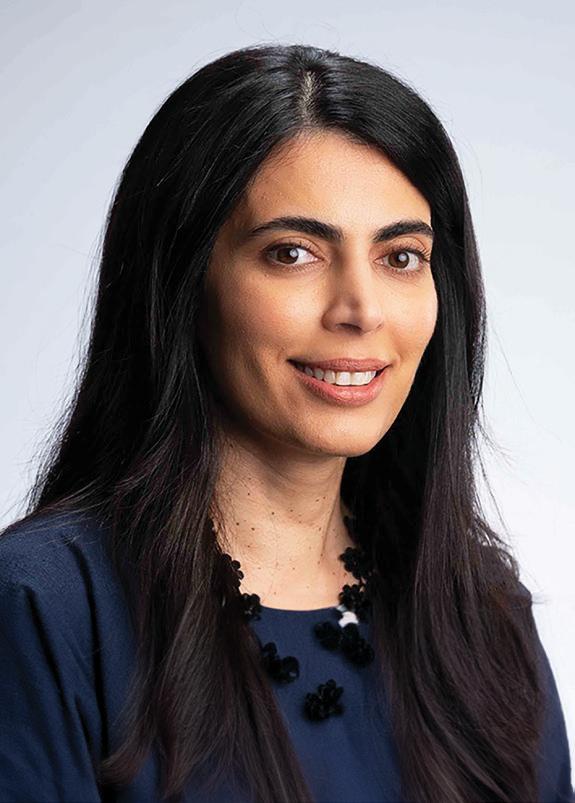
Emirati women are making a significant impact in finance and technology, with increasing opportunities in these fields.
The financial services sector, in particular, has been at the forefront of gender inclusivity, with leaders like Shamsa Al-Falasi, CEO of Citibank UAE Onshore, and Hana Al Rostamani, Group CEO at First Abu Dhabi Bank (FAB), setting new leadership standards.
maritime, and more. As the UAE continues to champion gender equality and provide robust opportunities, these remarkable women are breaking barriers and setting new standards of excellence.
The UAE’s commitment to gender inclusivity, exemplified by mandated female representation on corporate boards, has created an environment where talent thrives regardless of gender. This focus, coupled with strong educational opportunities and supportive policies, has enabled Emirati women to achieve significant milestones in the industry.
To young and ambitious Emirati women, my advice is to harness your potential and commit wholeheartedly to your goals. Utilise skill development and mentorship programmes, such as Visa’s She’s Next initiative, or the initiatives led by the Gender Balance Council UAE and the Dubai Women’s Business Council (DWBC), to get the support and knowledge needed to achieve your ambitions.
As Sheikha Fatima bint Mubarak, the Mother of the Nation, wisely stated, “Emirati women have proven day after day that nothing is impossible with hard work, diligence, creativity, and hope for a prosperous future.” Success is a collective effort; surround yourself with mentors and supporters who will guide, challenge, and help you grow.
We share inspiring insights of strong female leaders who are shaping the future of their industries and empowering the next generation to follow in their footsteps.
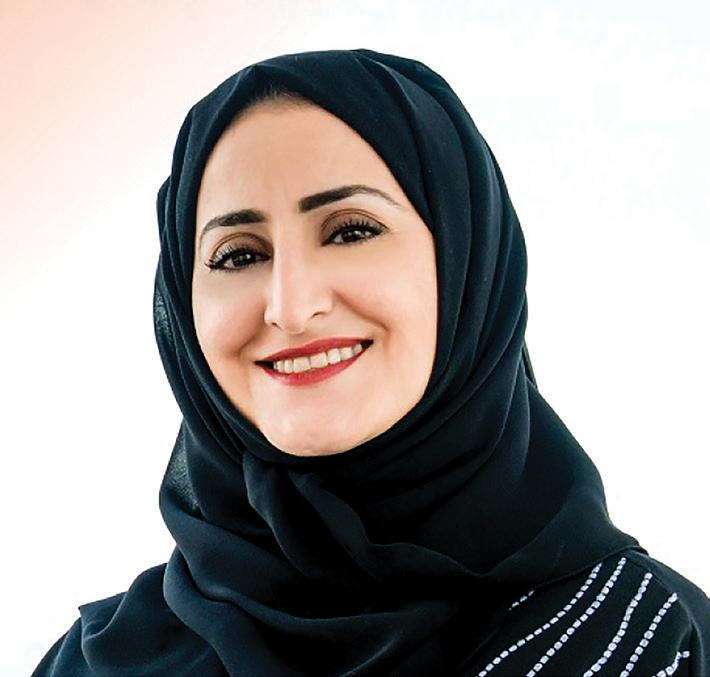
Emirati women are making their mark in the maritime sector, bringing determination and a drive to succeed in what has traditionally been a male-dominated industry. At Gulf Craft, we take pride in fostering an inclusive environment where women can thrive.
As more female engineers and professionals join our ranks, Emirati families are increasingly recognising the opportunities in this sector and supporting their daughters’ ambitions.
My advice to young Emirati women entering this field is to earn their place at the table through dedication and perseverance. Demonstrate your capabilities and embrace change, even in traditionally male-dominated spaces.

Emirati women are rapidly becoming key figures in the leisure, entertainment, and travel sector. At Miral, we witness their impact daily, from spearheading innovative guest experiences at Yas Island to managing complex operations and driving strategic marketing initiatives.
Their dedication, creativity, and passion are transforming the landscape in Abu Dhabi and across the UAE.
To aspiring Emirati women, I offer these guiding principles:
EMBRACE YOUR HERITAGE: Use
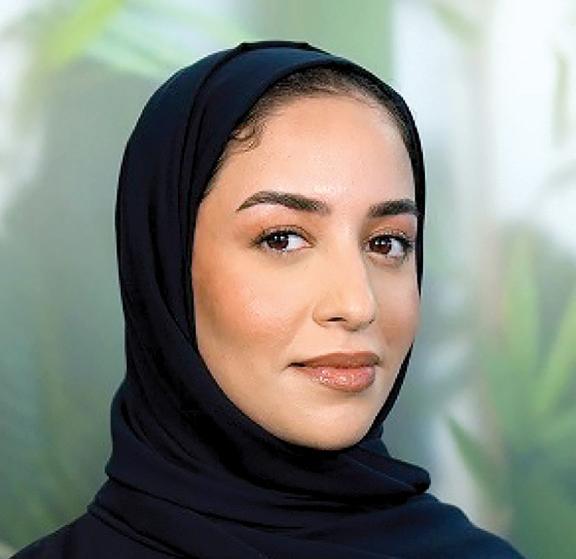
The professional services industry is witnessing an increasing number of Emirati women pursuing careers in auditing, consulting, and deals, drawn by the opportunities for professional development and exposure to diverse industries across the region.
Many of these women have transitioned from consulting roles to leadership positions in top government entities, where their expertise has enabled them to excel as leaders and entrepreneurs.
My advice to young Emirati women is to seek out female role models in your career. Establishing relationships with mentors can provide valuable insights, guidance, and encouragement, helping you navigate challenges and succeed.
MANAGER
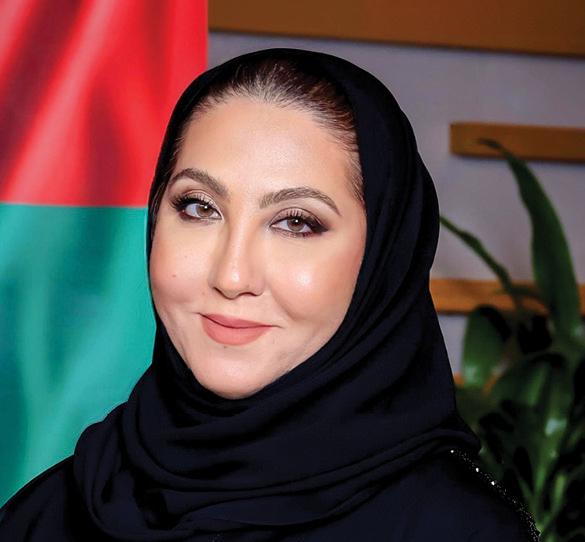
Emirati women are not just leaders but changemakers, powering transformative solutions and setting new standards for excellence in the industry.
Our organisation is fortunate to have such talented Emirati women at its helm, and we are proud of their hard work, diligence, and pioneering spirit. We are honoured to support their journey and celebrate their continued success as they help shape a brighter future for healthcare in the UAE.
OUR ORGANISATION IS FORTUNATE TO HAVE SUCH TALENTED EMIRATI WOMEN AT ITS HELM, AND WE ARE PROUD OF THEIR HARD WORK, DILIGENCE, AND PIONEERING SPIRIT.”
your unique cultural perspective to bring fresh ideas and authenticity to your work.
NEVER STOP LEARNING: Seek new knowledge, embrace technology, and be adaptable.
COLLABORATE WITH OTHERS: Connect with mentors and peers who inspire you, support each other, and celebrate successes together.
BE BOLD AND TAKE RISKS: Don’t be afraid to step outside your comfort zone and pursue opportunities that challenge and excite you.

Emirati women are more than just role models; they are the driving force behind our nation’s extraordinary journey. Their notable accomplishments in STEM, where they constitute an impressive 56 per cent of public university graduates, highlight just a fraction of their immense impact.
At Ducab, we are proud to have 80 per cent of our female management team spearheading change within our organisation. Their leadership exemplifies the boundless potential of Emirati women, who consistently surpass expectations in governance and innovation.
Let us celebrate their outstanding achievements and appreciate their tireless dedication to both our nation and society.
NOURA ALBLOOSHI GENERAL MANAGER, EMIRATES INSTITUTE OF FINANCE

Emirati women play a vital role in the UAE’s overall development, especially in the financial and banking sector. Thanks to our wise leadership, which prioritises investing in human resources and empowering women, the UAE has become a global leader in female empowerment.
At the Emirates Institute of Finance, we empower women through world-class training and provide them with the right tools and opportunities to thrive and grow, reflecting the vision set forth by our nation’s leadership.
Emirati women accounted for 32 per cent of participants in our training courses and workshops last year, with a 27 per cent increase in women’s participation over the past five years.
This indicates that women are encouraged to play an active role in the country’s economic progress.
WAOOD IBRAHIM AL MUTAWA
HR DIRECTOR, THE GALLERIA AL MARYAH ISLAND, AL MARYAH RETAIL COMPANY
Iam honoured to be part of a nation and an industry that recognises and celebrates the invaluable contributions of women.
The UAE’s National Policy for the Empowerment of Emirati Women 2023 – 2031 represents a steadfast commitment to providing every Emirati woman with the support and resources necessary to build a fulfilling and impactful career.
At the heart of this vision lies the crucial role of mentorship. By fostering strong mentor-mentee relationships, we can offer
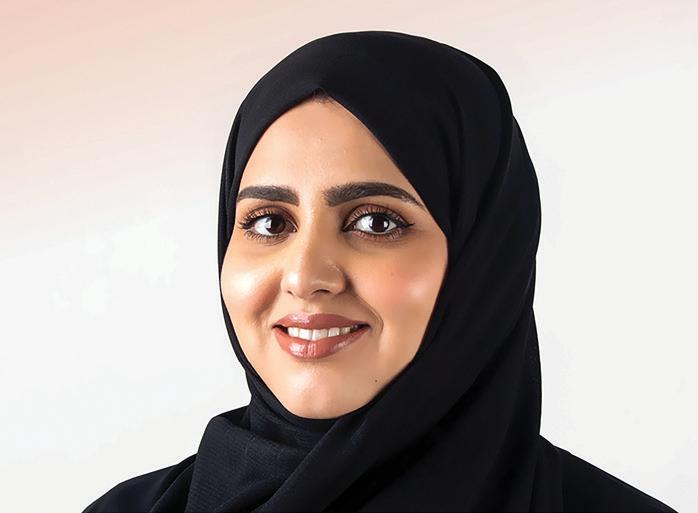
ALYA AL ZAROUNI COO, DIFC AUTHORITY
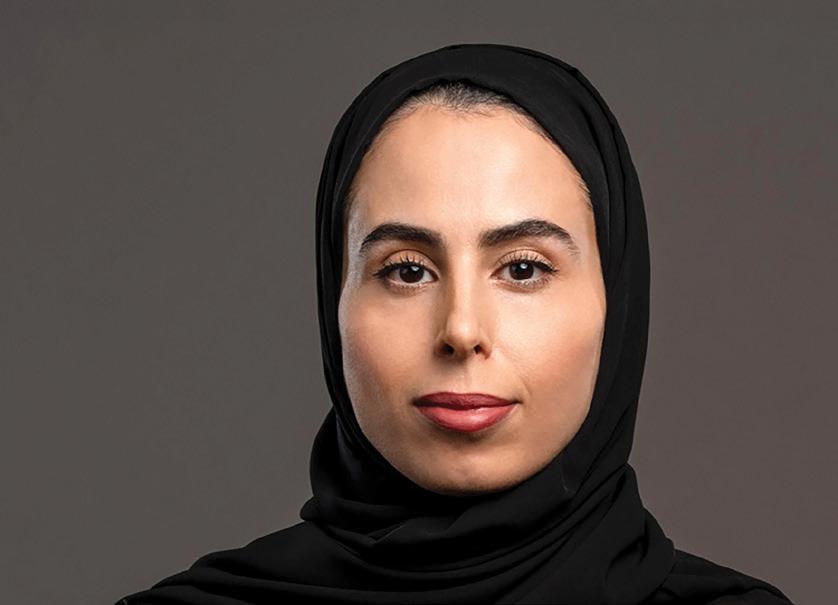
The UAE is a leading country in gender equality in the region, as highlighted by the World Economic Forum’s 2024 Global Gender Gap Report. As an Emirati woman, I am proud to be part of a nation that celebrates women’s achievements and provides limitless opportunities for reaching senior leadership positions.
At DIFC, we are grateful to Sheikha Fatima bint Mubarak, the ‘Mother of the Nation,’ for her support in encouraging Emirati women to lead pioneering achievements across vital sectors. We continue our efforts to create a supportive and enabling work environment that empowers women, tapping into their skills and potential, ultimately contributing to the UAE’s growth.
invaluable guidance, support, and inspiration to emerging female leaders. Together, we are not merely paving the way for the future; we are mentoring, empowering, and leading a path where our influence will resonate globally, leaving an indelible mark on the world. Through our dedication to mentorship, we are ensuring that the next generation of Emirati women is equipped with the knowledge, skills, and confidence to drive our nation forward, continuing the legacy of excellence and innovation that defines the UAE.

MARIAM AL MERAIKHI KEY ACCOUNT MANAGER, SCHNEIDER ELECTRIC
My journey as a young Emirati woman in the industrial sector came with its challenges, but with a love for what I do and the support of an amazing team, I found my way.
I’m continually inspired by Emirati women breaking new ground in this sector, especially in fields like digital automation, technology, and engineering. Their success shows the strength of diversity and the limitless potential of women. Remember, every challenge is a chance to grow, and with passion, you can achieve anything. L
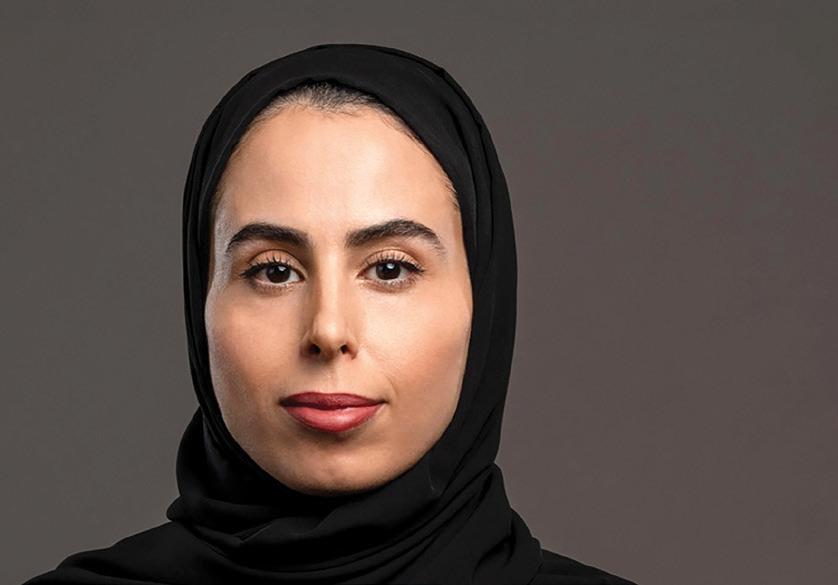

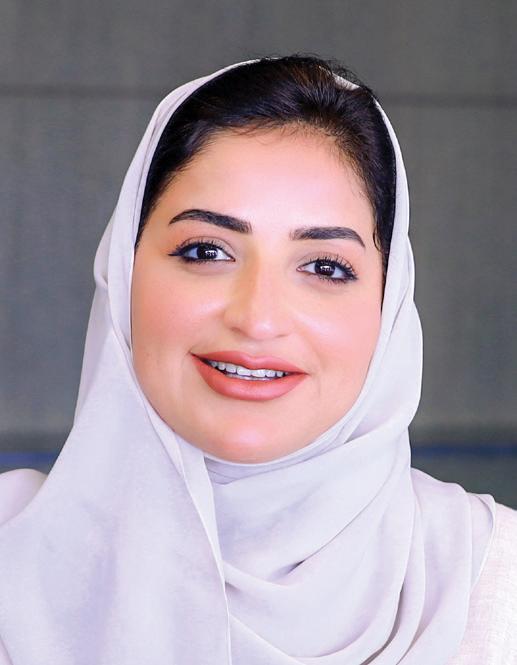



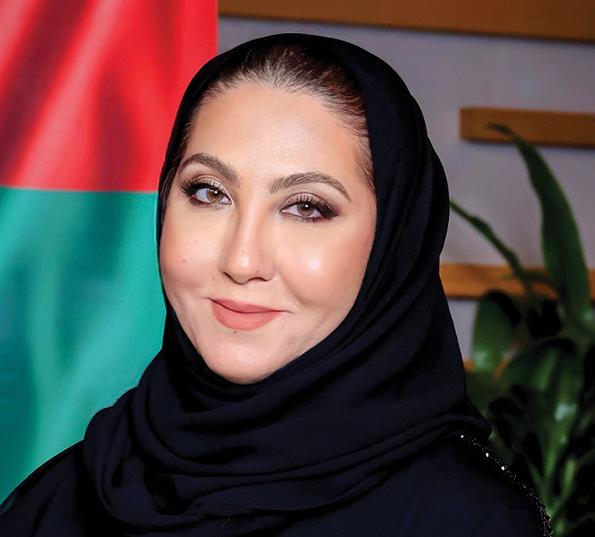
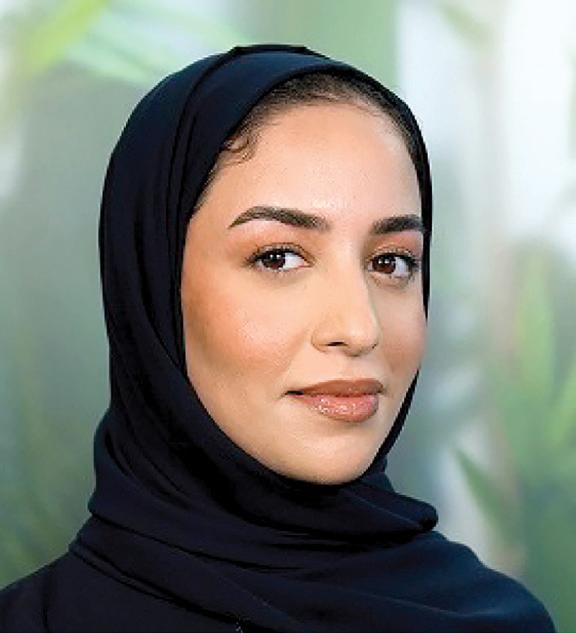




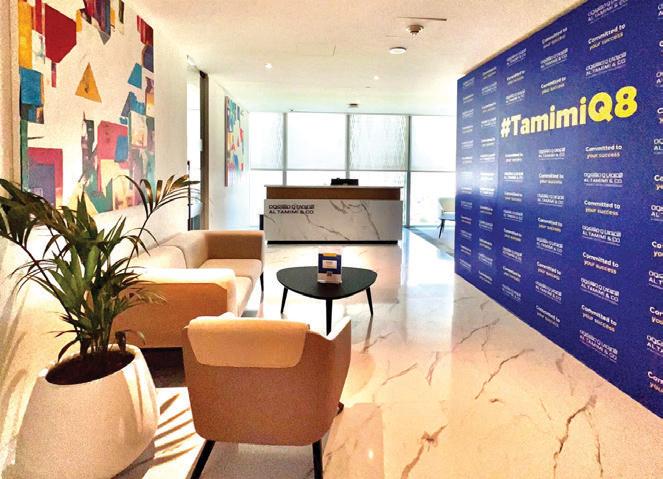
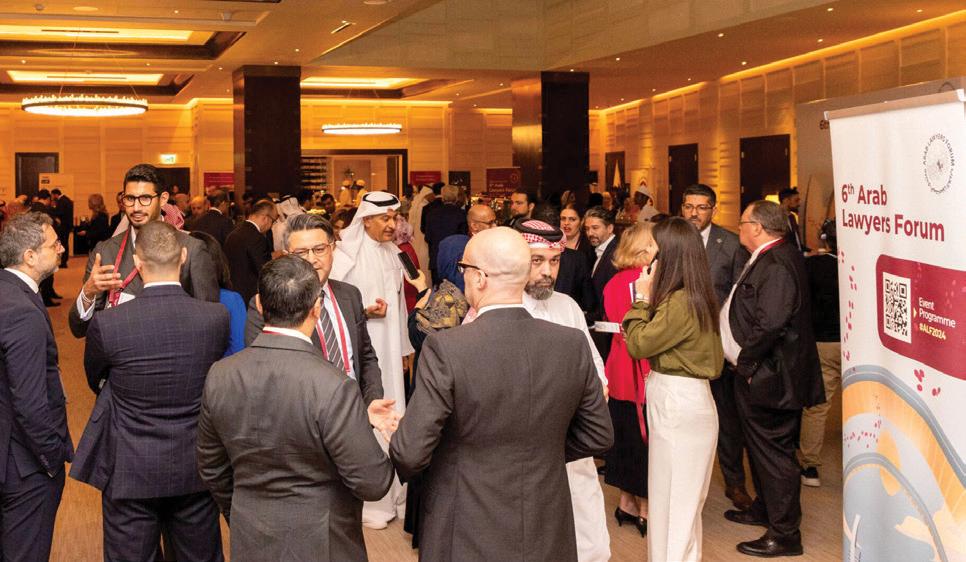
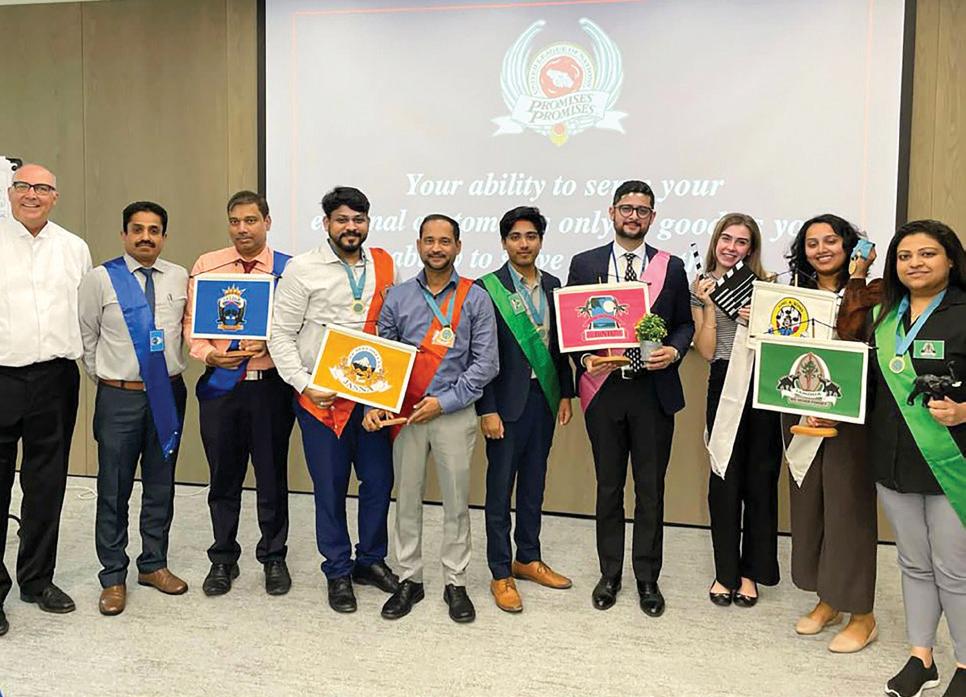
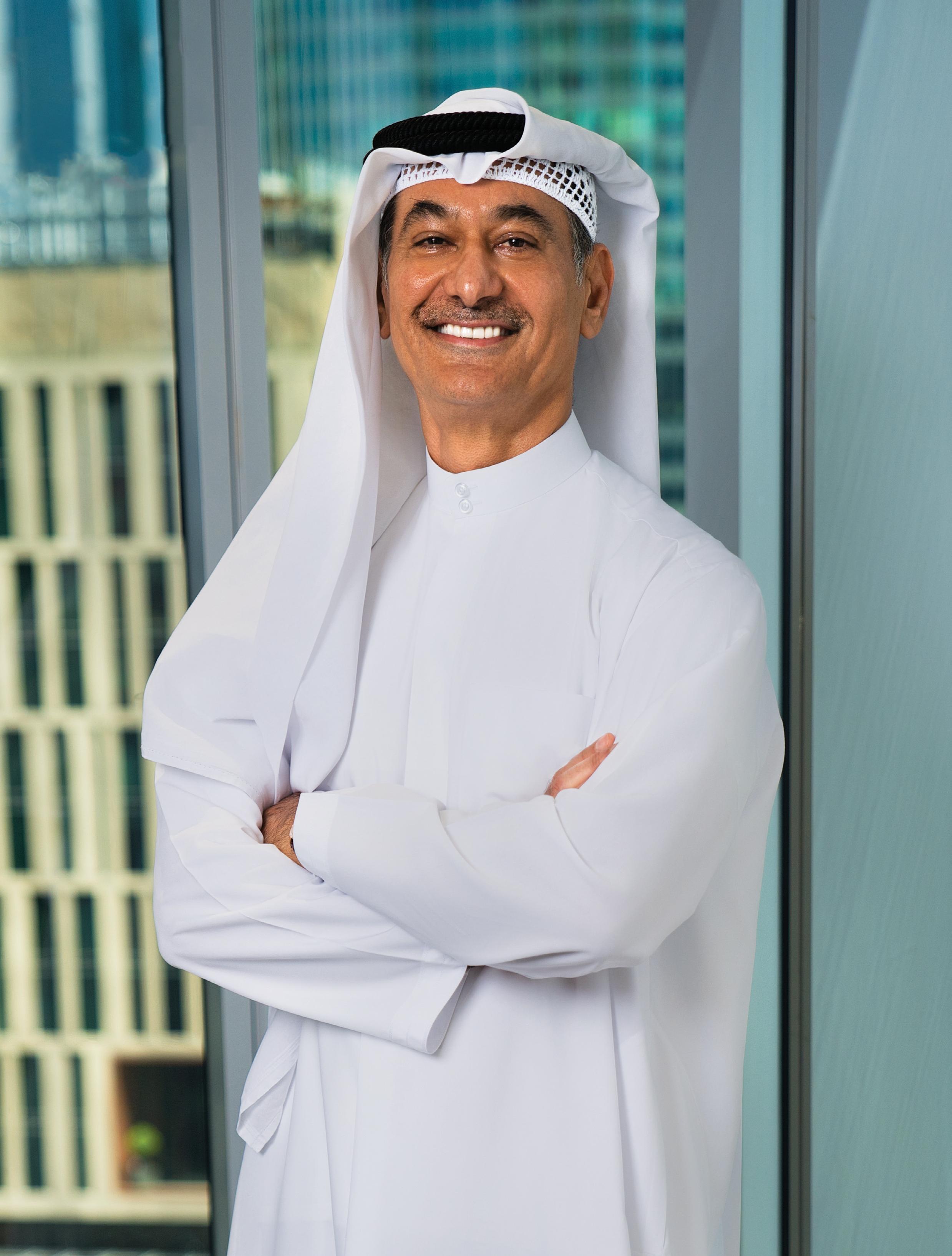












anthony@motivate.ae
manish.chopra@motivate.ae
rehab@motivate.ae
gareth.Vanzyl@motivate.ae
neesha@motivate.ae
ahmad@motivate.ae
freddie@motivate.ae
Sangeetha.js@motivate.ae
mario.saaiby@motivate.ae
joelle.albeaino@motivate.ae





